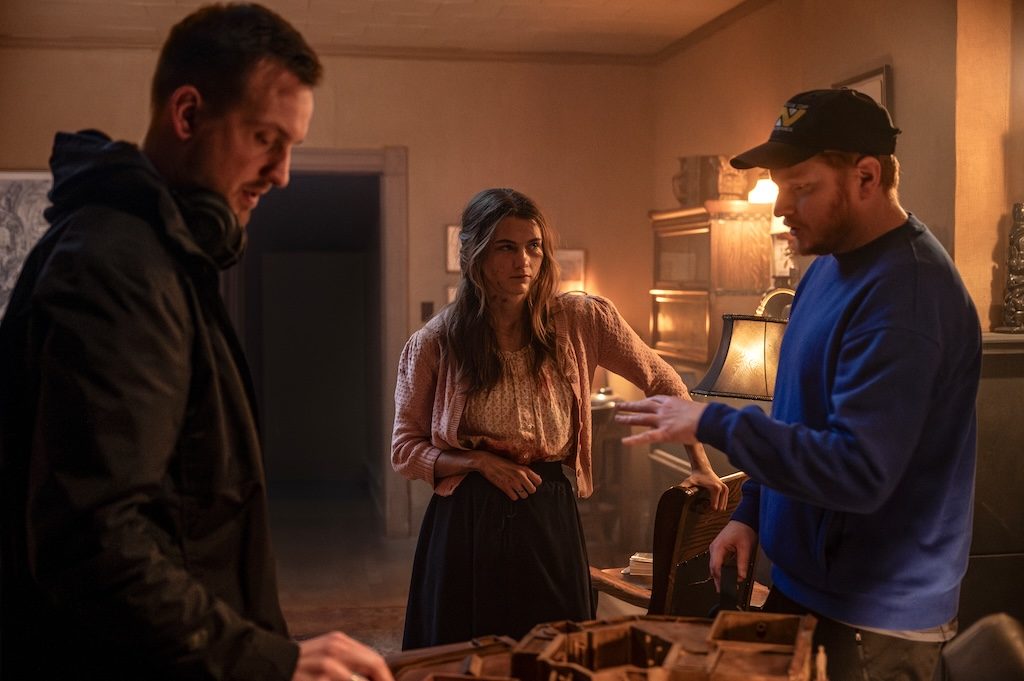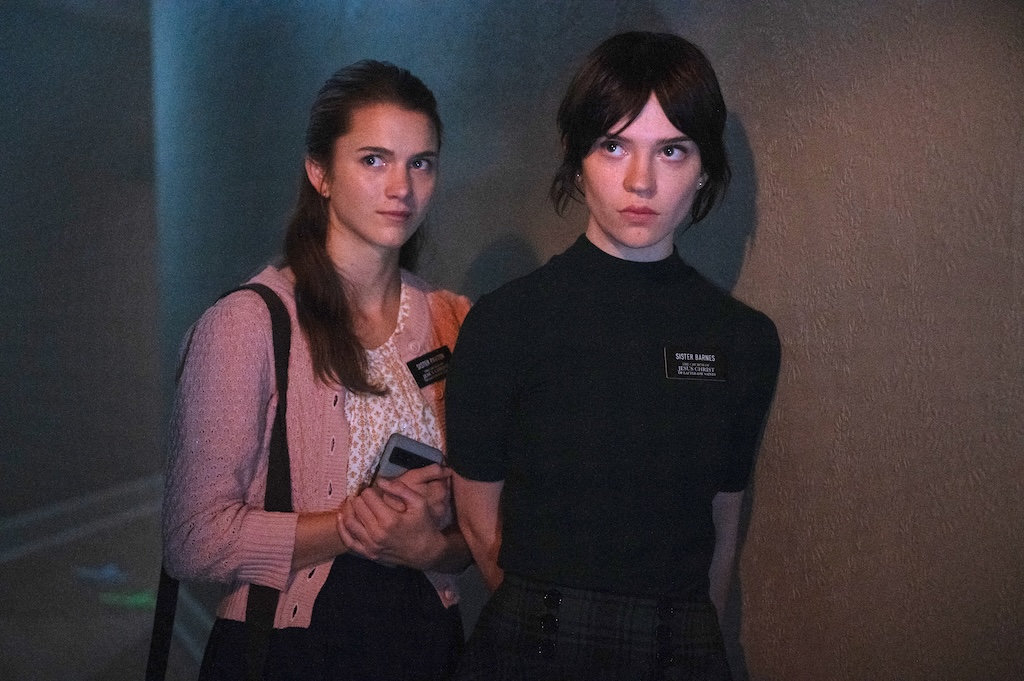heretic (noun): one who believes some doctrine contrary to the established faith or prevailing religion
Scott Beck and Brian Woods (A Quiet Place, Haunt) began writing their tale of a peculiar man who invites two Mormon missionaries to examine the dogma in their church in their film Heretic decades ago. The key player in their film is Mr. Reed (Hugh Grant), the colorful thinker who entraps two young missionaries Sister Paxton (Chloe East) and Sister Barnes (Sophie Thatcher) to question the nature and logic of their beliefs. Notably, Reed doesn’t tell them what to think, but rather, how to think, because beliefs aren’t necessarily based on facts nor should they always be. Reed poses many questions, but offers few answers in search of a greater truth.
The screenwriting duo spoke with Creative Screenwriting Magazine about constructing their smouldering psychological thriller.
“There’s the idea of somebody searching for more, for something that’s not right in front of them. There was something magical about trying to communicate that no one knows anything for certain and to challenge certain ideas. I think that’s the lifeblood of civilization,” muses Beck.
The screenwriting duo considered many titles for their enigmatic film, but Heretic kept coming back to them. “It was clean, simple and evocative of the horror genre.”
On The Origins Of Heretic
Beck and Woods have known each other since they were eleven years old and they conceived Heretic before A Quiet Place over a decade ago.
“I think we spoke about doing a movie that steeped in religious discourse when we were 16 or 17,” recalls Beck. Both writers had a religious upbringing that drove their interest in the subject matter. “We had this curiosity about exploring religion, not just from what we knew, but from outside influences. At that time when we were teenagers we knew nothing, we had no life experience and it felt we would have made a very narrow-minded film.”

Mr. Reed (Hugh Grant) Photo by Kimberly French/ A24 Films
About a decade ago Brian Woods pitched the idea about two Mormon missionaries that knock on a door to promote their church. That presented a scary premise, but they weren’t ready to write a screenplay without studying the key facets of various religions.
As the writers’ lives progressed, they married and mingled with people from an assortment of faiths including atheists and agnostics, making for fertile creative discussions as the basis for Heretic.
[More: “Our Take On Hitchcock’s ‘Vertigo’” Scott Beck & Bryan Woods Discuss ’50 States Of Fright’]
Meet The All-Questioning Mr. Reed
Mr. Reed is introduced as a charismatic character who invites the missionaries into his quizzical lair with the promise of blueberry pie and discussion about their church. He’s not immediately portrayed as a villain wanting to harm the missionaries. He’s a mystery since his intentions beyond prising open their minds are unclear.
The screenwriters hope the audience sees part of themselves in him through his ability to question certain orthodoxies stated as truths. Especially, for a religion merely decades old heavily borrowing from its precedents.
“There’s definitely a rebellious side of poking fun at religion and maybe finding inconsistencies or things that don’t add up. We wanted to put that that rebellious side of ourselves under a microscope and challenge that.”
Writing Mr. Reed’s character was a challenge the writing duo gladly embraced as they added layers to his complexity. “We had to write these long monologues from an extreme consciousness and point of view to speak fluent Mr. Reed.”
Scott Beck describes Mr. Reed as a “magician” of sorts. “He debates in a way that feels ethereal.”
Many religions rely on parables to illustrate their philosophy and Heretic raises the concern of taking such doctrines literally and rigidly.
“The biggest conflict lies in people who can’t see beyond what’s in front of them miss the underlying layers of what’s trying to be said,” argues Woods. “Our oldest frame of reference for this film is a play called Phaedrus which is a dialogue conversation between Socrates and Phaedrus. It talks about love and other lofty discourses in an accessible way and how this dialogue becomes a vessel for terror,” continues Woods.
Scott Beck has a more contemplative interpretation. “We ingest so much from different forms of entertainment and literature. There’s so much we imbue into these projects that almost becomes subconscious after a certain point.”
Much of the film is focused on mind games, the cerebral, and to a lesser extent the spiritual/divine
Meet Sisters Paxton and Barnes
It’s fascinating why the two women initially enter the house when it’s unclear whether Mrs. Reed is present.
“They’re salespeople. They’re selling religion and this idea of an afterlife that is not terrifying. They’re they’re selling a vision for a life that’s beautiful and their job is to make sure that they convert as many people as they can; in particular Sister Paxton who is a devout believer although she hasn’t converted as many people as her partner.” Sister Barnes is open to considering Mr. Reed’s discourse.
Both are slightly sheltered and a little naïve, but they understand that Mr. Reed has contacted their church for “further information.” They’re there to seal the deal and sign up more paying believers to their church. The two women have been paired based on their experience levels and aren’t necessarily friends in real life.

Scott Beck, Chloe East (Sister Paxton) & Bryan Woods. Photo by Kimberley French/ A24 Films
The filmmakers are familiar how many Mormons have been portrayed in popular culture.
“We’re representing the intelligence these sisters have. There is a meticulous nature they’re understanding their surroundings even when it gets dangerous,” notes Woods. They are not as naïve as Mr. Reed or the audience might think. They are worthy adversaries with a real chance of escaping his house.
On Genre
Heretic broods as a slow-burning psychological cerebral thriller/ horror. The writing duo contend that their story is mainly told through a horror lens. “If you don’t create an acceptance of death, and not wanting to believe what you already know, that permeates the horror.”
“There’s more visceral horror in Heretic which is about scaring the audience and provoking them with ideas that hopefully are very relatable when you start to break them down in terms of whether there is a god? If there is, then how do you explain the atrocities on earth? If there is no god, then there’s nothing overseeing us and that is also terrifying.” Mr. Reed echoes this sentiment in the movie.
The thriller aspect of Heretic is more subtle – suspense through discomfort. The sisters sense something is wrong, but they refrain from listening to their intuition and allowing it to simmer. They’re on a mission.
Mr. Reed “is playing this chess game where he’s challenging the two women and then he starts talking about fast food as a metaphor for religion. It disarms Paxton and Barnes, but both the sisters and audience feel like they’re on unsteady ground and shifting sands that constantly keep you on your toes.”
“You’re not quite sure where you are in the story, and from a structural standpoint, it breaks apart the expected flow of of what usually you see in thrillers or horrors,” states Beck.
Woods relishes the comedic, laugh-out-loud moments in Heretic which act as a pressure release valve which Steven Spielberg mastered in Jaws and Roman Polansky in Rosemary’s Baby.
Popping a joke as tension relief sometimes has a bigger impact than a straight joke in a movie.
End Game
Beck and Woods have no intention of making any judgment about religion. “We’re setting the table for this discourse and then letting the audience have a conversation as they leave the movie.”
Even Mr. Reed is on a journey of discovery. “He’s dissecting all the things that were presented to him. He’s experimenting and learning, and his real end goal is to discover the one true religion. Then it became manipulation.” He repeatedly reminds the women that they have complete freedom of choice and they can leave at any time, when in fact, they are trapped.,
The complexity and personal nature of faith suggests that many people sit somewhere along the believer/ non-believer spectrum. Sister Paxton begins as a true believer, but begins questioning because not everything can be knowable or explainable. There are no absolutes and truth can contain doubts. That is the nature of philosophy.
“I am realizing how profoundly hard it is for us to talk about this movie. We made this movie because we’re attempting to articulate what we were exploring,” concludes Woods.
